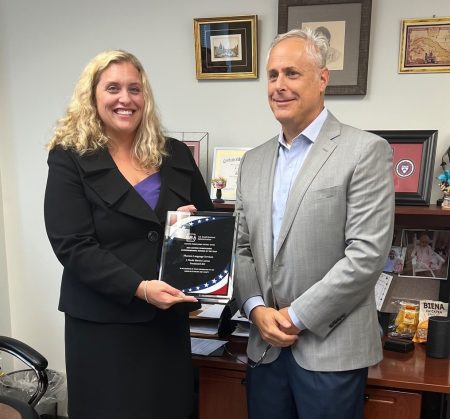Patrick Blennerhassett | (TNS) Las Vegas Review-Journal
LAS VEGAS — Bruce Hiatt hopes that integrating artificial intelligence will help advance his real estate company, potentially reducing the need for in-person agents.
Hiatt, a broker in Las Vegas and the owner of Luxury Realty Group, is currently testing an AI conversational avatar that talks to potential homebuyers and learns from these conversations. The technology is set to be launched in 22 U.S. cities and three in Canada in early June, with the goal of having around 24 agents in each city.
The idea behind using AI is to assist in the homebuying process by using software that can learn the names and preferences of potential homebuyers. Hiatt is collaborating with India-based chatbox builder Kore.ai on this technology. The company has received $150 million in new funding, including an investment from chipmaker Nvidia.
“Unlike ChatGPT, our AI website will have a fully conversational AI avatar. The avatar’s name is Luxora and she will engage conversationally with you as you ask questions about Las Vegas real estate,” Hiatt said. “She can also handle very complex, compound search requests you say to her. For example, ‘show me Summerlin homes in the Summerlin Ridges with four bedrooms, an office, 3.5 bathrooms, a four-car garage, a kitchen with a Wolf stove and ceiling height in the great room 25 feet or higher.’”
Hiatt acknowledged that there is resistance from employees regarding the integration of AI, as many fear the technology could lead to job loss.
“People assume all AI is like that,” he said. “And we may not be able to speak for how it will affect other industries, but as far as real estate agents go, the AI is more of an advisor, it will never be a licensed agent, there’s always that legal need for a licensed agent… there’s still a certain need for humans to do the work too, maybe just in a different way.”
Jonathan Catalano, a real estate agent with ERA Brokers Consolidated in Las Vegas, said he uses AI technology to help him write marketing materials and descriptions for homes he is listing. He said he is not worried about AI actually replacing the need for agents.
“I look at it from the standpoint that this technology is here and as a Realtor I need to embrace it and use it to my benefit,” he said. “So I didn’t shy away from it when I think a lot of people get afraid of it, I mean it’s so complex and powerful and generally people don’t like change so they’ll kind of steer clear of AI, but I’ve been using it every day in my business.”
Aya Shata, an assistant professor at UNLV’s Journalism and Media Studies, who has been studying AI’s integration into the media landscape and overall workforce and the ethical issues arising around the technology, said there is always an initial fear factor in public sentiment when something new comes around.
“I feel like it’s actually changing and for the better, and what I mean is that you always fear what you don’t know, but when you actually start to use AI, you realize it’s not really that perfect, and it can’t replace humans for so many reasons, it can’t replace jobs but it is definitely going to change how we do our jobs.”
Shata admitted that some big companies, especially in the online and technology sectors, have publicly announced they have been able to cut jobs and use AI to fill those positions instead.
“It's true that AI may replace some jobs, but not all or most of them,” she explained. “There are definitely jobs it can replace, but the important thing is that it will also create many new jobs. When social media first emerged, there were concerns, especially in traditional forms of communication like television and radio, but it hasn't entirely replaced them; it has adapted. Now we have many social media jobs such as social media managers, social media directors, and entire social media marketing agencies, all dedicated to managing social media.”
________
©2024 Las Vegas Review-Journal. Visit reviewjournal.com.. Distributed by Tribune Content Agency, LLC.









